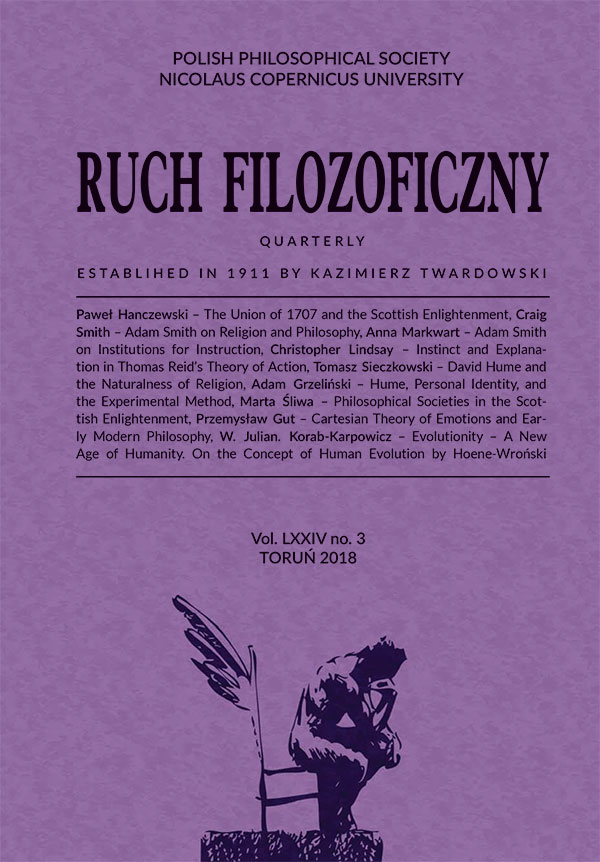Hume, Personal Identity, and the Experimental Method
DOI:
https://doi.org/10.12775/RF.2018.029Keywords
David Hume, personal identity, empiricism, passions, sympathy, moral agencyAbstract
The article focuses on the connection between David Hume’s explication of personal identity and what is supposed to be “experimental reasoning” introduced to moral subjects which the subtitle to the Treatise on Human Nature announces. On the basis of the results of analyses of the role of passions in creating personal identity I argue for the general coherence of Hume’s work. According to the interpretation, Hume’s intention was to present the multidimensionality of human identity in which the autobiographical construction of memory and understanding is supplemented with the identity built upon social relations. Eventually, personal identity finds its fulfilment in a person’s moral agency which reveals its practical dimension.
References
Ainslie, Donald C. “Scepticism about Persons in Book II of Hume’s Treatise.” Journal of the History of Philosophy 37, no. 3 (July 1999): 469–492.
Árdal, Páll. Passion and Value in Hume’s ‘Treatise’. Edinburgh: Edinburgh University Press, 1966.
Butler, Joseph. “On Personal Identity.” In The Analogy of Religion. London: J. M. Dent & Sons, 1936.
Carlson, Asa. “There is Just One Idea of Self in Hume’s Treatise.” Hume Studies 35, no. 1–2 (November 2009): 171–184.
Chazan, Pauline. “Pride, Virtue, and Self-Hood: A Reconstruction of Hume.” Canadian Journal of Philosophy 22, no. 1 (March 1992): 45–64.
Davidson, Donald. “Hume’s Cognitive Theory of Pride.” The Journal of Philosophy 73, no. 4 (November 1976): 744–757.
Garrett, Don. Cognition and Commitment in Hume’ Philosophy. New York-Oxford: Oxford University Press, 1997.
Glathe, Alfred. Hume’s Theory of the Passions and of Morals. Berkeley-Los Angeles: University of California Press, 1950.
Grzeliński, Adam. Kategorie “podmiotu” i “przedmiotu” w Dawida Hume’a nauce o ludzkiej naturze. Toruń: Wydawnictwo Naukowe UMK, 2005.
Hume, David. “A Dissertation on the Passions.” In A Dissertation on the Passions. The Natural History of Religion, edited by Tom L. Beachamp, 3–29. Oxford: Clarendon Press, 2007.
Hume, David. A Treatise on Human Nature, edited by Ernest C. Mossner. London: Penguin Books, 1969.
Hume, David. An Enquiry Concerning Human Understanding, edited by Lewis Amherst Selby-Bigge. Oxford: Clarendon Press, 1998.
Kemp Smith, Norman. The Philosophy of David Hume. London: Macmillan, 1941.
Locke, John. “An Essay Concerning Human Understanding.” In The Works of John Locke (London: Rivington, 1824), vol. 1–2.
Mijuskovic, Ben. “Hume and Shaftesbury on the Self.” Philosophical Quarterly 21, no. 85, (October 1971): 324–336.
Norton, David Fate. «David Hume» Common-Sense Moralists, Sceptical Metaphysician. New York-Princeton: Princeton University Press, 1982.
Pyka, Marek. O uczuciach, wartościach i sympatii. David Hume, Max Scheler. Kraków: Universitas, 1999.
Robison, Wade L. “Hume on Personal Identity.” The Philosophical Quarterly 11, no. 1 (April 1962): 181–193.
Rorty, Amélie Oksenberg. “‘Pride Produces the Idea of Self’: Hume on Moral Agency.” Australasian Journal of Philosophy 68, no. 3 (September 1990): 255–269.
Roth, Robert J. “Hume and James on Personal Identity.” American Catholic Philosophical Association” 64, no. 2 (1990): 233–247.
Downloads
Published
How to Cite
Issue
Section
Stats
Number of views and downloads: 904
Number of citations: 0



